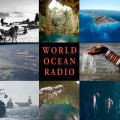
This week For The Wild Podcast presents Part One of a two-part conversation between brontë velez and Dr. Tiffany Lethabo King. Circumferencing Dr. Tiffany Lethabo King’s book The Black Shoals: Offshore Formations of Black and Native Studies, brontë and Tiffany explore sacred laughter, Black and Indigenous feminism, sexuality, liberation, ceremony, and protocol. This simultaneously intimate and expansive dialogue allows us to rethink the stories and structures we’ve been told regarding Black and Indigenous relations. Guided by a unquantifiable love and trust in Black and Native freedom dreams, Tiffany prompts us to explore ritual, space, and connection as antidote.
“To those who dance, share drum skins, chase smoke rings, and brush tongues to know each other’s languages.” — TIFFANY LETHABO KING / THE BLACK SHOALS
Recorded in January of 2021, this interview is a companion piece to a project called Can I Get A Witness, a collaborative transmedia project between For The Wild and Lead to Life. Can I Get A Witness “traces two queer Black-Latinx femmes, brontë velez and Stephanie Hewett, dancing before and being danced by the ecology, memory, and stories of the Tongass National Forests and Glacier Bay in southeast Alaska–unceded Haida, Tsimshian, Tlingit territories, scored by field recordings and music by Jiordi Rosales and José Rivera, and interviews from For The Wild Podcast episodes with Tiffany King, Wanda Kashudoha, and Kasyyahgei.
Tiffany Lethabo King (her/they) is a descendant of African people enslaved in the US South. She grew up in Lenapehoking and currently works/resides on Monacan Lands. King is an associate professor of Women, Gender, and Sexuality Studies at the University of Virginia. She is also a co-director of the Black and Indigenous Feminist Futures Institute (BIFFI) funded by the Mellon Foundation. Tiffany is the author of The Black Shoals: Offshore Formations of Black and Native Studies (Duke University Press, 2019). As a scholar and teacher, she is committed to thinking about how centuries long relationships between Black and Indigenous peoples have provided openings to alternative pasts, presents, and futures. Black and Indigenous liberation struggles informed by feminist and queer politics, as well as artistic production, and quotidian acts of survival and experimentation inspires her forthcoming scholarly and community building work.
brontë velez’s work/rest is guided by the call that “black wellness is the antithesis to state violence” (Mark Anthony Johnson). as a black-latinx transdisciplinary artist, trickster, jibarx and wakeworker, their eco-social art praxis lives at the intersections of black feminist placemaking, abolitionist theologies, environmental regeneration, and death doulaship. they embody this commitment through serving as creative director for Lead to Life and ecological educator for Weaving Earth. they are currently co-conjuring a mockumentary with esperanza spalding in collaboration with the San Francisco Symphony and practicing pastoral care as a co-steward of a land refuge in Kashia Pomo territory in California.
12-07-2022
-----
Also, an episode of World Ocean Radio: What COP 27 Might Have Been

What else might COP 27 have accomplished beyond the standard calls to action, recommendations and reports? In this episode we provide three examples of initiatives, proposals and financial solutions that could change the shape of our climate future yet were only cautiously embraced by the status quo. Is change possible?
12-06-2022
- KBOO


